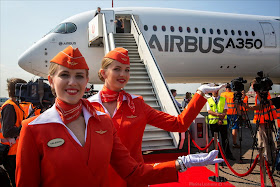Airbus and JAMCO have signed an agreement for the development, manufacture, supply and support of a new aft galley and lavatory module option for the A350 XWB aircraft Family.
The new galley arrangement, which will accommodate up to 16 trolleys and 2 lavatories integrated into the rear fuselage section, will become available from 2018 to airline customers as a ‘supplier-furnished-equipment’ (SFE) offering.
With this SFE contract, JAMCO becomes a ‘Tier1’ cabin supplier and risk-sharing partner to Airbus.
The new module is called “ICE Rear Galley”, in which the acronym “ICE” means “Increased Cabin Efficiency”.
This cross-product brand addresses the Airbus concept of packaging a selection of complementary cabin enablers to add more seats and reduce seat-mile costs, without reducing the seat-pitch comfort level for passengers.
Yoshihisa Suzuki, JAMCO’s President & CEO said: “This ICE Rear Galley project will be a very important opportunity for both Airbus and JAMCO to further develop our partnership for future.”
Fabrice Brégier, Airbus’ President & CEO said: “The A350’s customers will now be able to choose a new design for the cabin’s rear galley. This will allow them to include as many as 6 extra seats on their aircraft, while maintaining the same level of passenger comfort.”
As with the A350’s existing ‘V-shaped’ galley standard offer, this new option by JAMCO is compatible with the overhead cabin crew rest compartment in the rear fuselage.
The ICE Rear Galley option will be retrofitable on the A350-1000 from entry into service, and for the A350-900, structural provisions will be introduced for retrofit. All the other A350 XWB galley suppliers remain unchanged throughout the rest of the aircraft.
Based on the press release “Airbus and Jamco to introduce new rear-galley option for A350 XWB”


















































